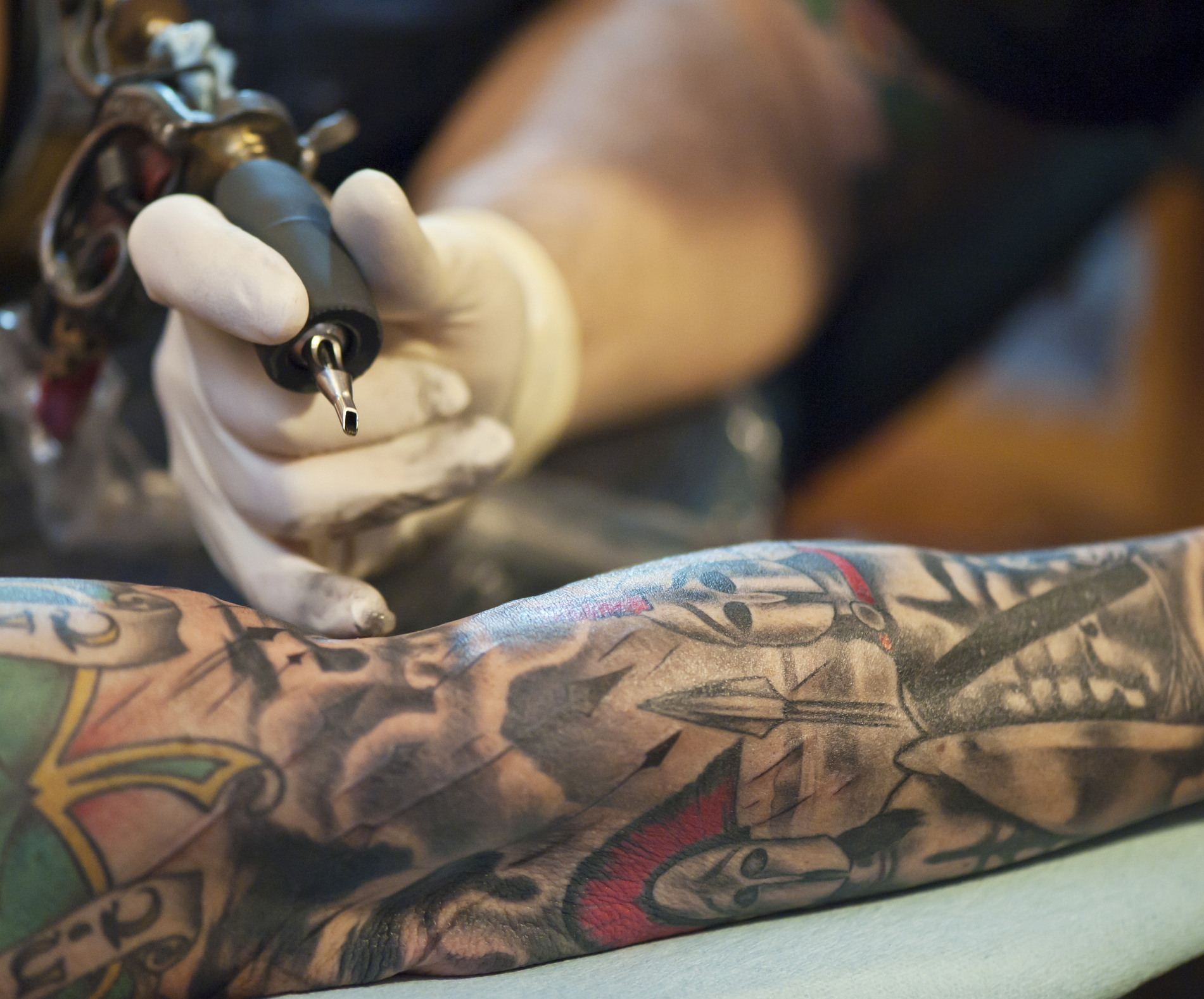How Call Her Daddy made bank off of lost young women.
Inked Nation

The link between tattoos and exhibiting troubling behaviors is growing stronger.
The Atlantic’s Isabel Fattal recently discussed America’s fascination with tattoos, referring to these body modifications as both “thrilling” and “reassuring.” What the author failed to mention is that tattoos are often a reflection of an individual’s damaged psyche. Getting a tattoo is not necessarily something to be celebrated. Instead it’s something to be examined, discussed—and, in many cases, lamented.
A more tattooed America means a more troubled America.
The author Jordan Weisman once described the “intensely human act” of getting a tattoo, of taking “some stray momentary emotion” and “cutting it into your body so that it could never heal and never be erased.” He’s not the first one to equate tattooing with self-mutilation, and he certainly won’t be the last. That’s because across the United States an increasing number of people are choosing to ink their bodies.
In 2021, the global market for tattoos was worth $1.75 billion; by the end of the decade, it is anticipated to be worth more than double that amount at $3.55 billion. Of all the countries in the world, the United States is one of the more heavily tattooed. A decade ago, according to Ipsos, one-fifth of the population, regardless of age, had at least one tattoo. Today, it’s closer to one-third of the population, or roughly 110 million people. And many of these enthusiasts are getting increasingly-eccentric modifications such as face tattoos.
“So what,” some will say, “my body, my choice.”
However, when you start to look at who is getting tattooed, and the association between tattoos and mental health, concerns begin to emerge.
Tattoos were once reserved for sailors, bikers, and gang members—specifically male sailors, bikers, and gang members. A tattooed woman was a novelty—recall the classic Harburg and Arlen song “Lydia, the Tattooed Lady,” immortalized by Groucho Marx in At the Circus. Today, a tattooed woman is no longer a rarity. The tattoo gender gap has been obliterated. In fact, 59 percent of tattoos in the United States belong to women. I have noted elsewhere that the line between men and women is blurring and that behaviors once exhibited solely by men are now frequently exhibited by women. More and more women are alcoholics and engage in acts of domestic violence, for example. Now they are also more likely to be tattooed than men. Interestingly (and worryingly), compared to women without tattoos, women with tattoos show significantly lower levels of self-esteem.
In the U.S., approximately 38 percent of adults between the ages of 18 and 29 have at least one tattoo. Individuals who fall into this category are members of Generation Z, the most depressed of all the generations. In fact, the average Gen Zer is about twice as likely to battle depression and feelings of hopelessness as members of other generations. Gen Z women are particularly vulnerable, it seems.
Those with tattoos tend to have a story to tell. If you listen carefully, and I have on many occasions, these stories are often heartbreaking accounts, full of pain and anguish—and, from time to time, plenty of anger. A 2015 study carried out by researchers in the U.K. showed that people with tattoos exhibit considerably higher levels of verbal aggression than people without tattoos. Not surprisingly, the researchers also found tattooed individuals to be more rebellious. In short, the more tattooed a person was, the more aggressive they tended to be.
A more recent study published in 2019 found tattooed individuals to be more impulsive and short-sighted. Impulsivity is associated with a broad range of problems, including increased drug dependence, personality disorders, bipolar disorder, and ADHD. To compound matters, the paper, written by researchers at Wilfrid Laurier University, also found the tattooed to be victims of discrimination considerably more often than the non-tattooed.
Sadly, for those of you who happen to be inked, the bad news doesn’t end there. Other studies suggest that tattoos may be associated with an increased risk of suicide, perhaps tying in with the abovementioned tendency toward impulsivity.
If you’re considering getting a tattoo, or if you are already tattooed and thinking of adding another one to the collection, ask yourself why. Will adding ink to your skin really make you feel any better? Tattoos are like graffiti on a Michelangelo and serve to desecrate rather than ennoble. Is any design or image comparable to God’s highest and best creation? Although I am not exactly a Kim Kardashian fan, she deserves a great deal credit for her refusal to be tattooed, and her explanation should be drilled into the heads of all young people—“You wouldn’t put a bumper sticker on a Bentley.” Indeed, and the human form is no billboard or back alley. So stop treating it like one.
Remember, the road to heavily-inked skin is paved with regret and shame, and the tattoo removal market is growing rapidly. An increasing number of people who once salivated at the idea of getting a tattoo (or multiple tattoos) now look at their artwork with a mixture of embarrassment and disgust. Tattoo regret could soon become a defining feature of the midlife crisis.
The American Mind presents a range of perspectives. Views are writers’ own and do not necessarily represent those of The Claremont Institute.
The American Mind is a publication of the Claremont Institute, a non-profit 501(c)(3) organization, dedicated to restoring the principles of the American Founding to their rightful, preeminent authority in our national life. Interested in supporting our work? Gifts to the Claremont Institute are tax-deductible.
Affluent hypocrisy has split America in two.
OnlyFans and the Sordid Underbelly of our Ruling Class
Connecting the dots the experts won’t
Ladies, go from cheap date to soul mate with this one neat trick.
A generation grows tired of the tiresome






